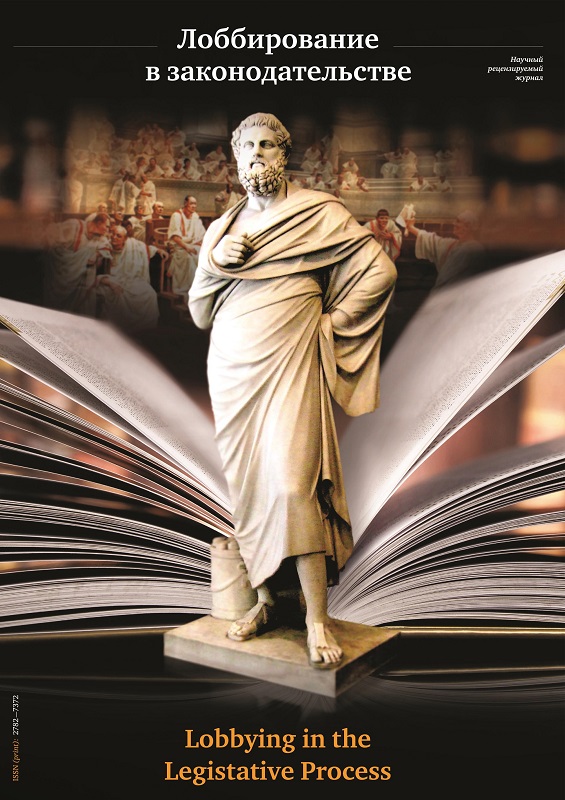Regulation of artificial intelligence technologies: the clash of ethics and law
- Autores: Begishev I.R.1, Shutova A.A.1
-
Afiliações:
- Kazan Innovative University named after V.G. Timiryasov
- Edição: Volume 4, Nº 1 (2025)
- Páginas: 21-27
- Seção: Theory and history law
- URL: https://journals.eco-vector.com/2782-7372/article/view/679638
- DOI: https://doi.org/10.33693/2782-7372-2025-4-1-21-28
- EDN: https://elibrary.ru/KUDRIG
- ID: 679638
Citar
Texto integral
Resumo
The purpose of this work is to determine the degree of influence of the ethics of artificial intelligence on legal regulation, as well as to establish the further direction of development of this technology: whether it will be based on regulations or ethical standards. The study’s conclusions showed that there is no unified approach to regulating artificial intelligence technologies in the Russian Federation, which leads to fragmentation of norms and uncertainties in their interpretation and application. It is noted that technological progress and the development of artificial intelligence have influenced both ethics and legislation. The necessity of ethical and legal regulation of this technology is emphasized. The inextricable link between ethics and law in the context of technological progress has been established, as well as the importance of preventing conflicts between them. The key importance is attached to the ethical and normative approach to regulating relations complicated by the use of artificial intelligence. The adoption of a single comprehensive federal law will make it possible to take into account existing ethical principles and solve existing problems related to the creation and application of this technology (both social and legal). Special attention should be paid to the ethical component of artificial intelligence, which requires constant monitoring and adaptation.
Texto integral
Sobre autores
Ildar Begishev
Kazan Innovative University named after V.G. Timiryasov
Autor responsável pela correspondência
Email: begishev@mail.ru
ORCID ID: 0000-0001-5619-4025
Código SPIN: 8859-9395
Scopus Author ID: 57205305394
Researcher ID: T-2409-2019
Dr. Sci. (Law), Associate Professor, Honored Lawyer of the Republic of Tatarstan, chief researcher, Institute of Digital Technologies and Law, Professor, Department of Criminal Law and Procedure
Rússia, KazanAlbina Shutova
Kazan Innovative University named after V.G. Timiryasov
Email: shutova1993@inbox.ru
ORCID ID: 0000-0003-3015-3684
Código SPIN: 5235-4319
Scopus Author ID: 57219032918
Researcher ID: GOG-9089-2022
Cand. Sci. (Law), chief researcher, Institute of Digital Technologies and Law, Professor, Department of Criminal Law and Procedure
Rússia, KazanBibliografia
- Bakhteev D.V. Ethical-legal models of the society interactions with the artificial intelligence technology. Journal of Digital Technologies and Law. 2023. Vol. 1. No. 2. Pp. 520–539. (In Rus.). doi: 10.21202/jdtl.2023.22. EDN: EKEUDK.
- Begishev I.R. Regulation of robotic technologies: the clash of ethics and law. In: Barilyak I.A., Begishev I.R. et al. Socio-psychological problems of modern society in the context of digitalization: personality, organization, management. Tver: Publishing House of Tver State University. 2021. Pp. 141–152.
- Jabir H., Lagtati K., Pohe-tokpa D. Ethical and legal regulation of using artificial intelligence in morocco. Journal of Digital Technologies and Law. 2024. Vol. 2. No. 2. Pp. 450–472. (In Rus.). doi: 10.21202/jdtl.2024.23. EDN: FSFSNQ.
- Leonov V.A., Kashtanova E.V. Artificial intelligence technologies in the organizational and management environment: Ethical issues. Personnel and Intellectual Resources Management in Russia. 2022. Vol. 11. No. 3. Pp. 12–16. (In Rus.)
- Khalturin A.N. Law in the system of social regulation: Socio-philosophical analysis. Bulletin of Chelyabinsk State University. 2017. No. 4 (400). Pp. 11–16. (In Rus.)
- Shutova A.A. Criminal law protection of the creation and application of artificial intelligence technologies in healthcare. Moscow: Prospect, 2025. 128 p. ISBN: 978-5-392-43588-3. doi: 10.31085/9785392435883-2025-128.
- Yadav N. Ethics of artificial intelligence and robotics: key issues and modern ways to solve them. Journal of Digital Technologies and Law. 2023. Vol. 1. No. 4. Pp. 955–972. (In Rus.). doi: 10.21202/jdtl.2023.41. EDN: MDIEFV.
- Bellaby R. The ethical problems of “intelligence–AI”. International Affairs. 2024. Vol. 100. Issue 6. Pp. 2525–2542. doi: 10.1093/ia/iiae227.
- Magrani E. New perspectives on ethics and the laws of artificial intelligence. Internet Policy Review. 2019. Vol. 8. Issue 3. doi: 10.14763/2019.3.1420.
- Naik N., Hameed B.M.Z., Shetty D.K. et al. Legal and ethical consideration in artificial intelligence in healthcare: Who takes responsibility? Frontiers in Surgery. 2022. Vol. 9. Art. 862322. doi: 10.3389/fsurg.2022.862322.
- Lupo G. The ethics of Artificial Intelligence: An analysis of ethical frameworks disciplining AI in justice and other contexts of applicatio. Oñati Socio-Legal Series. Norm, Normal and Disruption: The Role of Law, Knowledge and Technologies in Normalising Social Life. 2022. Vol. 12. Issue 3. Pp. 614–653.
Arquivos suplementares









